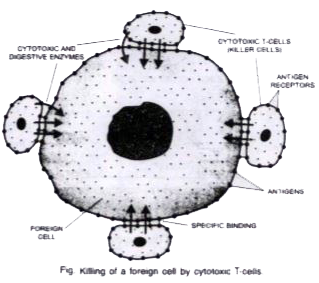What is immune system? What are its two main kinds? What is the role of B-cells and T-cells in body's defensive system?
Text Solution
Immune System in the Body.
It is a specialised system of the body that recognises foreign antigens, responds to them for. their elimination and keeps a memory of the same. It also has an important role in allergies, autoimmunity and organ transplantation. The system consists of antibodies, cells, tissues and lymphoid orggans. Working of immune system is based on two components, humoral and cell mediated.
1. Humoral Immune System or Antibody Mediated Immune System (AMIS). It consists of different types of antibodies that occur in the body humors or body fluids like lymph and blood plasma. The antibodies are formed by plasma cells which in turn are produced by B-lymphocytes. The cells are able to produce antibodies specific for each type of antigen by a system of rearrangement of their gene segments to form the gene required for formation of particular antibody. Humoral immune response or antibody mediated immunity (AMI) occurs against pathogens that enter body fluids.
2. Cell Mediated Immune System (CMIS). It is component of immune system which consists of T-lymphocytes. Cell mediated immune response or cell mediated immunity (CMI) functions against pathogens which pass into host cells. The immune system also operates against cancer cells and transplants. It also activates B-lymphocytes.
Types of T-cells and their Functions
1. Helper T cells (TH).TH cells are most numerous of the T cells. They help in the functions of immune system. They produce a growth factor that stimulates B-cell proliferation and differentiation and also stimulates antibody production by plasma cells, enhance activity of cytotoxic T cells.
2. Cytotoxic T cells (TC) or Killer cells. These cells are capable of killing microorganisms and even some of the body.s own cells directly hence they are called killer cells. The antigen receptors on the surfaces of the cytotoxic cells cause specific binding with antigens present on the surface of foreign cell.

Cell after binding, the cytotoxic T cell secretes hole-forming proteins, called performs, that punch large round holes in the membrane of the foreign cell. Then fluid flows quickly into the cell from the interstinal space. In addition, the cytotoxic T cell releases cytotoxic substances directly into the foreign cell. Almost immediately, the foreign cell becomes greatly swollen and it usually dissolves shortly thereafter. Thus they destroy body cells infected by viruses and attack and kill bacteria, fungi, parasites and cancer cells.
3. Memory T cells ( Primed Cells) These cells are also formed by T-lymphocytes as a result of exposure to antigen and remain in the lymphatic tissue (e.g., spleen, lymph nodes). They recognize original invading antigens even years after the first encounter. These cells keep ready to attack as soon as the same pathogens infect the body again. They proliferate and differentiate into cytotoxic T cells, helper T cells, suppressor T cells, and additional memory cells.
4. Suppressor Cells (Regulatory T cells (T)). These cells are capable of suppressing the functions of cytotoxic and helper T cells. They also inhibit the immune system from attacking the body.s own cells. It is believed that suppressor cells regulate the activities of the other cells. For this reason, the suppressor cells are classified as regulatory T cells.
Natural Killer (NK) Cells. NK cells attack and destroy target cells, participate in antibody dependent cell mediated cytotoxicity. They can also attack parasites which are much larger than bacteria.
Functions of B-cells. B-cells are sensitised both directly by antigens as well as by helper T cells. An activated B-lymphocyte enlarges and undergoes division to form plasmblasts and then plasma cells. Plasma cells have abundant endoplasmic reticulum. They are specialised to secrete antibodies. One type of plasma cell produces only a particular type of antibody. Each plasma cell can produce 2000 molecules of an antibody per second or 20 trillion molecules per day.
|
Topper's Solved these Questions
- HUMAN HEALTH AND DISEASEBOOK - BETTER CHOICE PUBLICATIONCHAPTER - HUMAN HEALTH AND DISEASEEXERCISE - LONG ANSWER TYPE QUESTIONS (MOST EXPECTED QUESTIONS)
12 Videos
- HUMAN HEALTH AND DISEASEBOOK - BETTER CHOICE PUBLICATIONCHAPTER - HUMAN HEALTH AND DISEASEEXERCISE - SHORT ANSWER TYPE QUESTIONS(MOST EXPECTED QUESTIONS)
9 Videos
- EVOLUTION BOOK - BETTER CHOICE PUBLICATIONCHAPTER - EVOLUTION EXERCISE - LONG ANSWER TYPE QUESTIONS (5 Marks) (MOST EXPECTED QUESTIONS)
13 Videos
- HUMAN REPRODUCTIONBOOK - BETTER CHOICE PUBLICATIONCHAPTER - HUMAN REPRODUCTIONEXERCISE - LONG ANSWER TYPE QUESTIONS
40 Videos
Similar Questions
Knowledge Check
What is the role of complement in the body's defense ?
AIt interfers with viral replicationBIt is involved antibody productionCIt aids antigen presentationDIt causes cell lysisWhat is the role of complement in the body's defense ?
AIt interferes with viral replication.BIt is involved with antibody production.CIt aids antigen presentation.DIt causes cell lysis.
What is the role of Plasma cells in body defence?
View SolutionWhat is the role of Helper-T cells in body defence?
View SolutionWhat is the role of the B-cells in the body's defence against infections?
View SolutionWhat is the role of complement in the body's defense ?
View SolutionWhat is the role of complement system?
View SolutionWhat is the role of complement system?
View Solution
